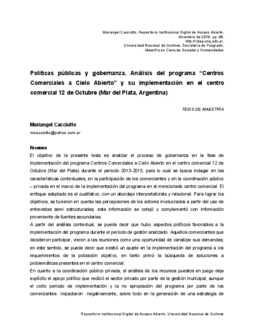Políticas públicas y gobernanza : análisis del programa “Centros Comerciales a Cielo Abierto” y su implementación en el centro comercial 12 de Octubre (Mar del Plata, Argentina)
Fecha
2019-12-04Autor
Cacciutto, MariangelResumen
El objetivo de la presente tesis es analizar el proceso de gobernanza en la fase de implementación del programa Centros Comerciales a Cielo Abierto en el centro comercial 12 de Octubre (Mar del Plata) durante el periodo 2013-2015; para lo cual se busca indagar en las características contextuales, en la participación de los comerciantes y en la coordinación público – privada en el marco de la implementación del programa en el mencionado centro comercial. El enfoque adoptado es el cualitativo, con un abordaje interpretativista y relacional. Para lograr los objetivos, se tuvieron en cuenta las percepciones de los actores involucrados a partir del uso de entrevistas semi estructuradas; esta información se cotejó y complementó con información proveniente de fuentes secundarias.
A partir del análisis contextual, se puede decir que hubo aspectos políticos favorables a la implementación del programa durante el periodo de gestón analizado. Aquellos comerciantes que decidieron participar, vieron a las reuniones como una oportunidad de canalizar sus demandas; en este sentido, se puede decir que existió un ajuste en la implementación del programa a los requerimientos de la población objetivo, en tanto primó la búsqueda de soluciones a problemáticas presentes en el centro comercial.
En cuanto a la coordinación público privada, el análisis de los recursos puestos en juego deja explícito el apoyo político que recibió el sector privado por parte de la gestión municipal, aunque el corto periodo de implementación y la no apropiación del programa por parte de los comerciantes impactaron negativamente, sobre todo en la generación de una estrategia de autosustento que permita su continuidad al margen del cambio de gestión y el consecuente recorte de presupuesto.
En función del análisis realizado, se puede decir que el programa CCCA fue una experiencia de co gobernanza, en tanto ha partido de la iniciativa privada y ha implicado una gestión asociada junto al sector público, con la participación de la población objetivo, aunque puede decirse también que existen algunos aspectos de gobernanza jerárquica, ya que la implementación se encuentra enmarcada en una estructura burocrática.
La gobernanza de la implementación del programa en el CCCA 12 de Octubre se ha observado en un nivel micro, correspondiéndose con la interacción entre actores para la solución de problemas y la creación de oportunidades en el marco de la complejidad. La investigación realizada da como resultado una evaluación a posteriori no convencional de la implementación del programa en el centro comercial 12 de Octubre, en tanto se tuvo en cuenta las percepciones de los actores implicados, del sector público, privado y de la sociedad civil, lo cual permite retroalimentar el proceso, generando los cambios que se consideren propicios para superar las limitaciones observadas y manteniendo los aciertos. The objective of this thesis is to analyze the governance process in the implementation phase of the Centros Comerciales a Cielo Abierto program at the 12 de Octubre commercial center (Mar del Plata) during the 2013-2015 period; for which it is sought to investigate the contextual characteristics, in the participation of the merchants and in the public - private coordination in the frame of the implementation of the program in the aforementioned commercial center. The adopted approach is the qualitative one, with an interpretative and relational approach. To achieve the objectives, the perceptions of the actors involved were taken into account through the use of semi-structured interviews; this information was collated and supplemented with information from secondary sources.
From the contextual analysis, it can be said that there were political aspects favorable to the implementation of the program during the analyzed period. Those merchants who decided to participate saw the meetings as an opportunity to channel their demands; In this sense, it can be said that there was an adjustment in the implementation of the program to the requirements of the target population, while the search for solutions to problems present in the commercial center prevailed.
Regarding public-private coordination, the analysis of the resources put into play leaves explicit the political support that the private sector received from municipal management, although the short period of implementation and the non-appropriation of the program by the merchants negatively impacted on the implementation, especially in the generation of a self-sustaining strategy that allows its continuity regardless of the change of management and the consequent budget cut.
Based on the analysis carried out, it can be said that the CCCA program was an experience of co-governance, as it started from the private initiative and involved an associated management together with the public sector, with the participation of the target population, although it can be said that also that there are some aspects of hierarchical governance, since the implementation is framed in a bureaucratic structure.
The governance of the implementation of the program in the CCCA 12 de Octubre has been observed at a micro level, corresponding to the interaction between actors for the solution of problems and the creation of opportunities within the framework of complexity.The research carried out results in an unconventional a posteriori evaluation of the implementation of the Centros Comerciales a Cielo Abierto program in the 12 de Octubre commercial center, while taking into account the perceptions of the actors involved, from the public sector, private sector and civil society. which allows feedback to the process, generating the changes that are considered favorable to overcome the observed limitations and maintaining the successful procedures.

